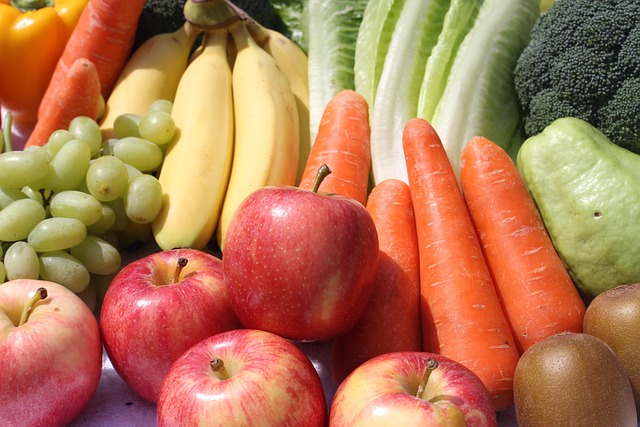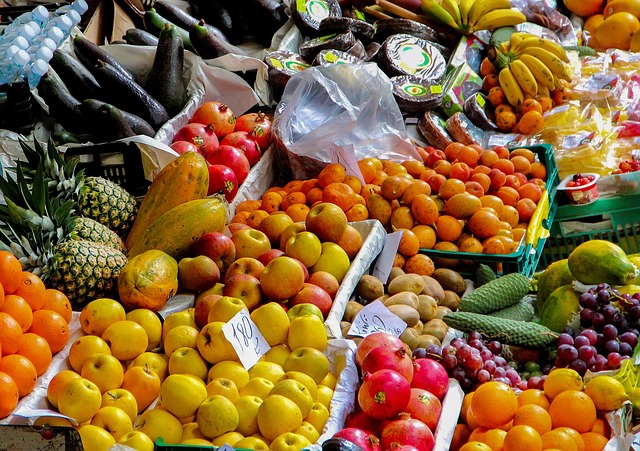Introduction
Fruits and vegetables are some of the healthiest foods we can eat every day. Not only that, fruits and vegetables are full of vitamins, minerals, fiber, and water, which help our bodies stay strong and function properly. As a result, eating fruits and vegetables every day can protect us from getting sick, boost our energy, and even improve our mood. In addition, they come in many colors, shapes, and flavors, which makes them fun and tasty to eat. Whether you prefer apples, bananas, carrots, or spinach, adding more fruits and vegetables to your meals is a smart and simple way to stay healthy.

Why Fruits and Vegetables Are Important?
1. Fruits and Vegetables Help Keep Us Healthy
- They give our bodies the vitamins and minerals we need, like Vitamin C for strong gums and Vitamin A for good eyesight.
- Fruits and vegetables help our immune system fight off colds and other illnesses.
2. These Are Good for Digestion
- They have fiber, which helps us go to the bathroom regularly and keeps our stomach feeling good.
- Fiber from fruits and vegetables also helps clean our digestive system and keeps it working smoothly.
3. Fruits and Vegetables Protect Us from Diseases
- Eating plenty of fruits and vegetables can lower the chance of getting serious illnesses like heart disease, diabetes, and some cancers.
- The natural antioxidants in fruits and vegetables protect our body’s cells from damage.
4. These are Help Us Stay at a Healthy Weight
- Most fruits and vegetables are low in calories and fat, so we can eat more of them without gaining too much weight.
- They help us feel full longer, which stops us from eating too many unhealthy snacks.
5. Good for Our Skin and Hair
- The vitamins in fruits and vegetables, like Vitamin C and E, help our skin stay smooth and glowing.
- They also make our hair stronger and shinier because they give our body the nutrients it needs to grow healthy hair.
Health Benefits of Eating Fruits and Vegetables Daily

1. Reduces the Risk of Chronic Diseases
Regular consumption of fruits and vegetables can significantly lower the risk of many serious health conditions. In fact, studies have shown that diets rich in plant-based foods can reduce the risk of heart disease, stroke, and certain types of cancer. For instance, the antioxidants found in berries help fight harmful free radicals, which can damage cells and potentially lead to cancer.
2. Supports Digestive Health
Fiber in fruits and vegetables plays a key role in keeping the digestive system running smoothly. Moreover, it promotes regular bowel movements and can help prevent issues such as constipation, diverticulosis, and hemorrhoids. In addition, fiber supports healthy gut bacteria, which in turn boosts immunity and improves the absorption of nutrients.
3. Improves Mental Health
Emerging research suggests that what we eat also affects how we feel mentally. Specifically, diets high in fruits and vegetables are linked to a better mood, reduced risk of depression, and improved energy levels. One possible reason for this is the high levels of antioxidants and vitamins found in these foods, which, in turn, support brain health.
4. Helps with Weight Management
Because they are low in calories and high in fiber and water, fruits and vegetables help you feel full without overeating. As a result, including them in meals and snacks can reduce the temptation to eat unhealthy, high-calorie foods. Therefore, they are a smart choice for anyone trying to eat better and manage their weight.
5. Keeps Skin and Hair Healthy
Fruits and vegetables contain vitamins and antioxidants that promote healthy skin and hair. For instance, Vitamin C is essential for collagen production, which helps keep skin firm and youthful. Additionally, Vitamin A plays a crucial role in skin cell repair, helping to maintain a smooth and healthy appearance.
Easy Ways to Include More Fruits and Vegetables in Your Diet:

1. Start Your Day with Fruits
- Add banana or apple slices to your cereal or oatmeal.
- Make a fruit smoothie with milk or yogurt.
- Eat a piece of fruit like an orange or grapes with your breakfast.
2. Keep Fruits and Vegetables Ready to Eat
- Wash and cut fruits and vegetables ahead of time.
- Keep small packs of carrots, cucumber slices, or apple wedges in the fridge.
- Store fruits in a bowl on the table to remind you to eat them.
3. Add Vegetables to Meals You Already Eat
- Mix chopped veggies like carrots, tomatoes, or spinach into rice or pasta.
- Add lettuce, cucumber, and tomatoes to your sandwich or wrap.
- Put extra vegetables in soups, stews, or even noodles.
4. Snack on Fruits and Vegetables
- Choose fruits like bananas, apples, or berries instead of chips or candy.
- Dip veggie sticks like carrots or bell peppers in hummus or yogurt dip.
- Freeze grapes or fruit slices for a cool, healthy treat.
5. Make Smoothies and Juices
- Blend fruits like bananas, strawberries, and mango with milk or water for a tasty smoothie.
- Add spinach or carrots to the smoothie — you won’t even taste them!
- Choose 100% fruit or vegetable juice with no added sugar when buying from a store.
6. Try New Recipes and New Vegetables
- Make fun dishes like veggie pizza or fruit salad.
- Try roasting vegetables like sweet potatoes or broccoli for better flavor.
- Try one new fruit or vegetable each week to find new favorites.
7. Involve the Whole Family
- Let kids help choose fruits and vegetables at the store.
- Cook meals together and add more veggies to the recipe.
- Make it a fun game to eat different colored fruits and vegetables each day.
Common Myths About Fruits and Vegetables
Myth 1: Fresh is always best.
Truth: While fresh fruits and vegetables are great, frozen, canned, and dried versions are also healthy, as long as they don’t have added sugars or salt.
Myth 2: Fruits are too sugary.
Truth: Fruits contain natural sugar, which is very different from added sugar. Whole fruits also provide fiber and important nutrients.
Myth 3: Potatoes count as vegetables.
Truth: While potatoes are nutritious, they are high in starch and are more like grains than vegetables when it comes to dietary planning.
Conclusion
Eating fruits and vegetables every day is one of the simplest yet most powerful steps you can take to improve your health. They provide essential nutrients that support nearly every part of the body — from the brain and heart to the skin and digestive system. Whether eaten raw, cooked, blended, or juiced, they offer a variety of flavors, colors, and textures to enjoy.
By making fruits and vegetables a regular part of your meals and snacks, you’re not just adding color and variety to your plate — you’re investing in a healthier, happier future. Start small, be consistent, and enjoy the many benefits that come from nature’s most powerful foods.
